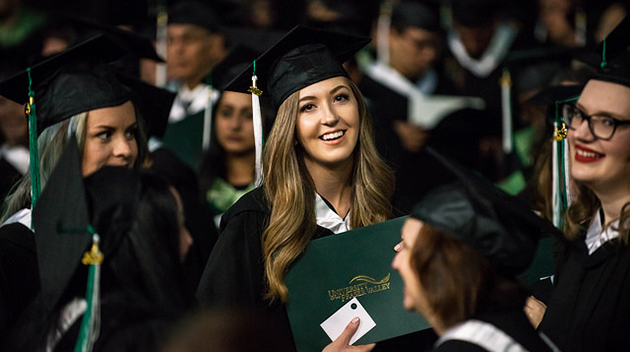After more than three years of development, UFV will now offer two new degree programs within the bachelor of arts. The programs, peace and conflict studies (PACS) and theatre studies, come as a result of increasing demand from students and the community. Both programs have been set to begin in the Fall 2017 semester.
Both degree programs are unique in that they offer focuses not offered elsewhere in the Lower Mainland. Dr. Alisa Webb, the associate dean of students for the college of arts, who reviewed the program proposal, curriculum, and calendar copy for the new programs, said the programs were in high demand.
“Theatre students have long asked for a major to increase their marketability within creative industry and to enhance their graduate school applications,” Webb said. “As for PACS, we live in a global world in which conflict and the need for peace are ever present.”
Surveys conducted by Institutional Research showed that 90 per cent of theatre program students were interested in a theatre major.
A focus of UFV’s has been to create programs that are individualized to the institution. Their desire is to build a specific environment that students would want or need to come to because it is only offered at UFV. The university has also made a commitment — as outlined in their Education Plan — to be a student-focused institution rather than research-based.
“The PACS major and minor are unique programs in Western Canada,” said Webb. “Until now, students interested in focusing on peace and conflict studies at the degree level needed to travel to Winnipeg.”
Dr. Steven Schroeder, a faculty member in the UFV history department, chaired the peace and conflict studies program working group.
“There are numerous aspects of the PACS program that, at least in my view, render it distinct,” said Schroeder. “Each respective PACS program develops uniquely, based on the expertise and resources of the faculty members and university in which it develops.”
The PACS program has two essential elements: research-based academic learning and engagement, and practical application in peacebuilding work. PACS is a field of study that examines conflict and peace strategies spanning a large sphere of inquiry, from conflict in personal relationships, to conflicts in the local community or internationally.
“It spans a very wide field of inquiry, from conflict in personal relationships, to conflicts in the community, the nation, and in international relations,” said Schroeder.
UFV’s theatre program also comes highly anticipated and is unique in the Lower Mainland because of its comprehensive approach to theatre and performance studies. Theatre majors will study applied practical theatre skills in conjunction with a liberal arts education, giving students a broad range of transferable skills.
Theatre department head Dr. Heather Davis-Fisch was part of the program development committee that created the proposal for the theatre major and a member of the college of arts curriculum committee when the theatre major was approved.
“Performance is everywhere — just look at the U.S. presidential race,” said Davis-Fisch. “Because our theatre major is focused not only on traditional theatre but on performance studies, our graduates will be well-equipped to analyze and critique the performances that surround them.”
Community members have also been supportive of the development for the theatre major, particularly because of UFV’s theatre having been a part of the community for 35 years.
“UFV theatre department has been a central fixture in the Fraser Valley, not only offering numerous productions a year, but also graduating students who have gone on to expand on creative practice and opportunities within their communities,” said Webb.
The programs were approved after more than three years of deliberation within UFV’s own committees, and the Ministry of Advanced Education. Much of the cause for delay resulted from a change in education ministers and a review of the Ministry’s Degree Quality Assurance Board procedures followed by changes to the process of assessment. While UFV’s internal approval process takes about 18 months, government approval took over two years.


